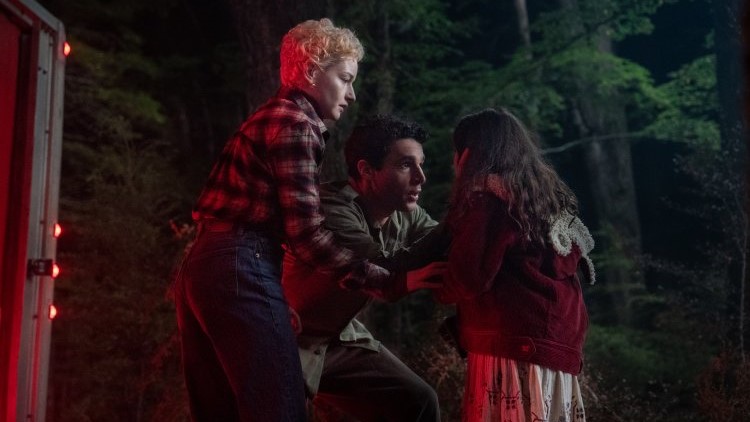Wolf Man

When his father's death is certified after years of being missing, Blake Lovell (Christopher Abbot) inherits his family home in a rural part of Oregon. With hopes of repairing his marriage to his investigative journalist wife Charlotte (Julia Garner), Blake suggests they take a break from San Francisco and head to the country with their young daughter Ginger (Matilda Firth). But before they've even reached the old Lovell farmhouse, they're attacked by some kind of wild animal in "Wolf Man."
Laura's Review: C
Writer (with Corbett Tuck)/director Leigh Whannell gave us a #MeToo version of "The Invisible Man" which incorporated themes of sexual harassment and psychological abuse. Now, with his adaptation of "The Wolf Man," he attempts to do the same with generational child abuse and the result is far less satisfying. Whannell has built in-the-moment tension into his film, but by the time his final, foreshadowed scene arrives, one is left wondering just what the point was.
The film begins in 1995 with a flashback to Blake as a young boy (Zac Chandler), his father, Grady Lovell (Sam Jaeger, "The Eyes of Tammy Faye"), loving but gruff, frequently yelling at the boy for not listening, concerned about his survival in Oregon's remote woods, especially as rumors have long swirled about a missing hunger and a 'disease' Native Americans referred to as 'The Face of the Wolf.' With Blake having been chastised for wandering off to get a better shot at a deer, his dad, noting a noise, finds a creature in his gun site and demands the boy run towards the deer blind. Something follows them up the ladder, it's breath rising in misty tendrils, but after Grady fires, the Lovells find nothing. Later Blake will overhear his agitated dad on his basement radio, telling his friend Dan that he saw 'it.'
Thirty years later we find the adult Blake walking through the streets of San Francisco with his 8 year-old daughter and when Ginger climbs up on some barriers, Blake yells, demanding she get down right now, echoes of Grady in the intensity of his anger. He apologizes, though, explaining that it is his job to protect her and that he was scared. They then play an obviously long-running game where Blake pretends Ginger can read his mind. 'I love my daughter very much,' she guesses, Blake declaring her truly gifted. They're still playing back in their apartment as Blake cooks dinner when Charlotte comes in, on the phone with work related business. 'Please take that in the other room,' Blake demands of her not once, but twice and Charlotte bristles. The next day as she leaves work with some colleagues, she finds Blake sitting on the stairs. He's brought lunch, asks if she is happy and suggests spending some family time in the home he's just learned is now his. The next thing we know, Blake's driving a U-Haul type truck down a dirt road, wondering if he is at the end of his old driveway.
That's when Ginger notes a figure in that old deer blind in the distance and it turns out to be someone Blake knew as a child, Derek (Benedict Hardie, 2020's "The Invisible Man"), his father's friend Dan's son. Charlotte overreacts because he's carrying a shotgun, but quickly gets in the back seat so Derek can guide them to the Lovell Farm. But it's getting dark and a strange figure standing in the middle of the road causes Blake to veer down a hill, the truck overturning and hung up in a tree. Derek falls out and is dragged off by that mysterious figure. Blake gets his family gathered and they run, barely making it into the farm, that figure now on all fours, in hot pursuit.
There will be generators to start and that old radio to try, but Charlotte will notice blood dripping down Blake's arm from what appears to be claw marks. Soon he begins to change in odd ways while the creature outside continues to rampage.
Whannell goes for a more humanoid version of a werewolf, Abbott's gradual transformation beginning with the *loss* of much of his thick curly hair while his face becomes mottled and his teeth begin to fall out. Much of the transformation is conveyed by allowing the audience to experience what Blake is experiencing as his senses become more acute, his vision overcoming darkness, his sense of smell sharper and his hearing intensified (the latter is illustrated by a loud thudding sound which turns out to be a spider climbing up a wall, but while the scene itself is effective, Blake's hearing is inconsistent throughout the rest of the film). Perhaps the best effect is cinematographer Stefan Duscio's revolving shots from Blake to one of his girls and vice versa, sight and sound morphing along with character perspective. Blake's final transformation happens outside, his jaw jutting out, his teeth replaced by fangs, his torso barreling outward, his nails replaced by claws, but like so much of the rest of the film, the imagery is too dark to fully appreciate what is going on.
But while Whannell stages some frightening moments between Blake and the original wolf man and Blake and his own family, it is his narrative theme that is weak. Young Blake may have been frightened by his survivalist dad's harsh rebukes, but Grady is no monster. And while we see the father's anger in his son, Ginger isn't afraid of her dad, in fact, adores him, the only real generational difference being that one threatens family while the other manages to save it. Most disappointing of all, though, is a thoroughly anticlimactic climax, the film simply ending instead of providing any kind of emotional catharsis.
Universal Pictures releases "Wolf Man" in theaters on 1/17/25.

